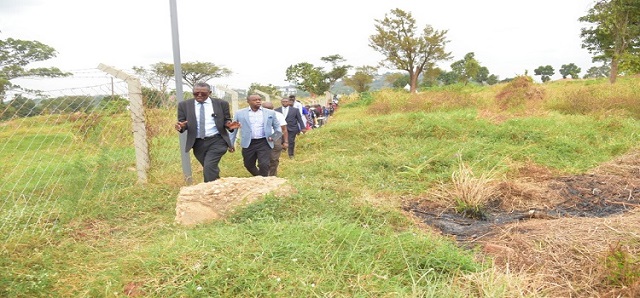
Kampala, Uganda | THE INDEPENDENT | Parliaments Committee on Health has said it plans to meet persons who have encroached on the 10 acres for Uganda Heart Institute (UHI) in Naguru.
The 10 acres of land is for the construction of a state-of-the-art cardiac facility that will facilitate the treatment of cardiovascular diseases like heart attacks, heart blocks, dying hearts, heart failure and cardiac arrest among others.
However, although the Heart Institute was apportioned 10 acres by the President for the construction, they own 7.5 acres while 2.5 acres remain encroached upon according to the Executive Director UHI, Dr. John Omagino.
Omagino revealed this while meeting members of the committee who were on a site visit on Monday, 18 July 2022 to ascertain the state of the land where the cardiac facility is to be built in the Nakawa-Naguru area.
The committee is scrutinizing a request by government to borrow US$73 million for the first construction phase of the cardiac facility.
Omagino said that during the lockdown, an entity named Tendo Investments fenced off over one acre of land and placed a container in it and yet they have a land title for the whole 10 acres.
He cited other encroachers as Kampala Capital City Authority (KCCA) Division offices in Nakawa, a church in the area, and Lukyamuzi Investments.
“All we want is the Uganda Land Commission, the Ministry of Finance and the Attorney General to sort it out; we want vacant possession,” he said.
He said the other boundary challenge with KCCA and the church should be sorted by the surveyors.
“The available land is enough for the project to kick start; if we start soon, we can finish the project in two years and by 10 years, we should be able to conduct heart transplants,” Omagino said.
He told MPs that they are ready with the project and are only waiting for the money to be allocated.
The Chairperson of the Committee, Dr. Charles Ayume said that the committee intends to invite all the encroachers of the land and give them a fair hearing.
He says as a committee, they are fully in support of the construction of the facility and they will ensure that the land is passed.
He says in the first phase of the construction project, they will support it.
“We agreed that we shall support the loan request; we have come to ascertain whether the land exists and we have come and ascertained. This facility is for the good of the country. So many people have heart problems and they will no longer have to fly to India,” Ayume said.
Ayume also proposed that an ambulance lane be constructed along Naguru road to ensure that patients get priority in the area. He says that the construction of the cardiac centre will help in stopping the hemorrhage of treatment costs abroad, and also grow medical tourism.
Dr. Elisa Rutahigwa, a member of the committee and the Rukungiri Municipality MP said that he is shocked that some Ugandans are encroaching on the Uganda Heart Institute land. He says historically, Ugandans use to give land to Government for development.
“I request all of them to leave the land for the Uganda land institute.At least I know everyone has a heart, and once the heart has a problem, it should be taken care of by the institute,” he said.
In 2007, the Government signed a Public-Private Partnership Agreement with an investor, Opec Prime Properties to redevelop the Naguru-Nakawa housing estates into two ultra-modern sustainable satellite towns. The agreement was signed after the eviction of thousands of residents.
When the development failed to kickstart, the government in 2018 terminated the contract for the development of the area and the Land Commission repossessed the land, before reallocating it to new developers.
The heart institute currently operates at Mulago Hospital.
*****
SOURCE: UGANDA PARLIAMENT MEDIA
 The Independent Uganda: You get the Truth we Pay the Price
The Independent Uganda: You get the Truth we Pay the Price




Ah the committee on health
Thank you for the work you do; indeed
I listened to the presentation related to the public health act
The shadow minister, i agree with you for the word expressed (explicit) in relation to offering care but please add the word quality to trigger interest in availability of basic needs to ensure safety for all at the health facility
I am quite disturbed, if the reason for doing away with STD related business is availability of antibiotics; which ones are you talking about? There is surveillance on gonorrhoea in this country and the increase in antimicrobial resistance is recorded
Else where in the world these infections are of concern. Needless to mention the Ugandan history and STDS, well described (Owor R), the trigger for introduction of modern health services
It is so Ugandan that a publication on no use of barrier methods is available for Ugandans living else where
So are we soon to abandon contact tracing because antibiotics are available?!
Last but not least, is transport of the infected, then contaminated belongings. Before the diagnosis is confirmed several samples are taken and items used on the individual, they contain the same contagion just like one that is feared after diagnosis. Where does this waste go within the local government’s? Even some health facilities- taking waste to burn in a Bush far away or transporting it all over the country when it is not decontaminated: such practice require strict regulations
Instead we see piles of Clinical waste in the communities or well labelled vehicles travelling to the community dumping site!
We have a lot of hope
The chair said the venereal disease CAP 281 was being left out because there are antibiotics
This did not go down well with some Ugandans, because use of antibiotics increases pressure on evolving resistance; attempts should be made to minimise it, and control spread of existing resistance
A number of references to bring the problem to the team were sent
Please add the one below ( hopefully, they will reach the intended recipients)
Stds, we have antimicrobial agents resistance among some venereal diseases (http://publichealth.jmir.org) 10.06.2020
One would have expected the team to have a question related to preventing the evolution and control of spread of antimicrobial resistance for each of the engagements that they get involved in.
This problem is being considered a global threat
So the budgets here in to factor in the requirements of the National Action Plan
Forgive us , if we have crossed the line, it is the only way we can repay those passed on the art